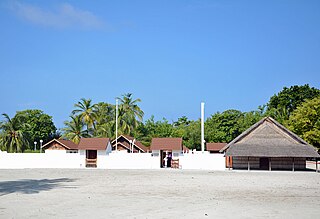Related Research Articles

The Hijri calendar, or Arabic calendar also known in English as the Muslim calendar and Islamic calendar, is a lunar calendar consisting of 12 lunar months in a year of 354 or 355 days. It is used to determine the proper days of Islamic holidays and rituals, such as the annual fasting and the annual season for the great pilgrimage. In almost all countries where the predominant religion is Islam, the civil calendar is the Gregorian calendar, with Syriac month-names used in the Levant and Mesopotamia but the religious calendar is the Hijri one.

The history of the Maldives is intertwined with the history of the broader Indian subcontinent and the surrounding regions, comprising the areas of South Asia and Indian Ocean; and the modern nation consisting of 26 natural atolls, comprising 1194 islands. Historically, the Maldives held a strategic importance due to its location on the major marine routes of the Indian Ocean. The Maldives' nearest neighbours are the British Indian Ocean Territory, Sri Lanka and India. The United Kingdom, Sri Lanka and some Indian kingdoms have had cultural and economic ties with the Maldives for centuries. In addition to these countries, Maldivians also traded with Aceh and many other kingdoms in, what is today, Indonesia and Malaysia. The Maldives provided the main source of cowrie shells, then used as a currency throughout Asia and parts of the East African coast. Most probably Maldives were influenced by Kalingas of ancient India who were earliest sea traders to Sri Lanka and the Maldives from India and were responsible for the spread of Buddhism. Stashes of Chinese crockery found buried in various locations in the Maldives also show that there was direct or indirect trade contact between China and the Maldives. In 1411 and 1430, the Chinese admiral Zheng He 鄭和 visited the Maldives. The Chinese also became the first country to establish a diplomatic office in the Maldives, when the Chinese nationalist government based in Taipei opened an embassy in Malé in 1966. This office has since been replaced by the embassy of the People's Republic of China.
As-Sulṭaan al-Ghaazee Muhammad Thakurufaanu al-A'uẓam or As-Sultan Ghazi Muhammad Bodu Thakurufaanu ruled over the Maldives Islands from 1573 to 1585. He is known for fighting the Portuguese who ruled over the Maldives from 1558–1573 after killing Sultan Ali VI in Malé. His victory is commemorated in the Maldives as Qaumee Dhuvas or National Day. He was also the first Maldivian Sultan to form a Lashkaru. He is regarded as a national hero.

Thinadhoo City is the capital of Gaafu Dhaalu region in the atoll of Huvadhu and the proposed capital for the Upper South Province of the Maldives. It has its own dialect of Dhivehi which is considerably different from northern speech.
Thakandhoo is one of the inhabited islands of Haa Alif Atoll administrative division and is geographically part of Thiladhummathi Atoll in the north of the Maldives. It is an island-level administrative constituency governed by the Thakandhoo Island Council.

Utheemu is one of the inhabited islands of Haa Alif Atoll administrative division and geographically part of Thiladhummathi Atoll in the north of the Maldives. It is an island-level administrative constituency governed by the Utheemu Island Council.

Rabiʽ al-Awwal is the third month of the Islamic calendar. The name Rabī‘ al-awwal means "the first month or beginning of spring", referring to its position in the pre-Islamic Arabian calendar.

The Utheemu dynasty was created in 1573 when Muhammad Thakurufaanu Al Auzam became sultan of the Maldives. The dynasty was named after the northern Maldives island of Utheemu, birthplace of Muhammad Thakurufaan. Muhammad Thakurufaan is considered a national hero, as he and his two brothers led a successful rebellion against the Portuguese and established his country's independence. Thirteen more sultans ruled during this dynastic period, which ended in 1697.
Sultan Muhammad may refer to:

The Islamic Centre is an architectural landmark in Malé, Maldives opened in November 1984 by President Maumoon Abdul Gayoom.
A constitutional referendum was held in the Maldives on 17 and 18 April 1952. The new constitution would convert the country from a monarchy to a republic.
This is a list of holidays in Maldives.
Mohamed Jamaaluddin is an important 16th century scholar and immigrant to Maldives who settled in Vaadu island in the Huvadu atoll of Maldives.
Ghaazee Bandaarain is a 1982 Maldivian historical film developed by Television Maldives in association with Tolour Productions. The film was released in three parts where the first two parts were directed by Hussain Shihab and Kashima Ahmed Shakir respectively. It stars Adam Zahir, Ibrahim Moosa, Ahmed Shakir, Abdul Rasheed Hassan, Zuhaira Umar and Chilhiya Moosa Manik in pivotal roles. The film narrates the journey of three war hero siblings, Muhammad Thakurufaanu, Ali Thakurufaanu and Hassan Thakurufaanu, whom with his companions fought an eight-year-long war to drive out the Portuguese invaders who occupied the Maldives from 1558 to 1573.

Several interregnums occurred in the history of the Maldives.
The Bihuroazu Kamanaa Mosque or the Bihuroazu Kamanaa Miskiy is one of the oldest mosques in Malé. According to historical documents, the Bihuroazu Mosque was built before Sultan Muhammad Thakurufaanu was established as the king of Maldives. The mosque was built by Bihuroazu Fashan akalo. The mosque was named Bihuroazu Fashana kalo Mosque. The word Bihuroazu comes from the Persian language, meaning "prosperous".

The Sultanate of Maldive Islands was an Islamic monarchy that controlled the Maldives for 815 years (1153–1968), with one interruption from 1953–1954.
The following lists events that happened during 2023 in the Maldives.
The royal palaces of Maldives (Dhivehi: ގަނޑުވަރު Is the royal palace of Monarch of the Maldives The Sultanate of Maldives was abolished in 1968
References
- 1 2 3 "Maldives National Day". Archived from the original on April 13, 2013.
- ↑ "Maldives: Qaumee Dhuvas". National Day. Retrieved 2024-03-05.
- ↑ "As-Sultan Al-Ghaazee Muhammad Thakurufaanu Al-Auzam" (PDF). National Centre for Linguistic and Historical Research. Archived (PDF) from the original on 11 November 2023. Retrieved 5 March 2024.